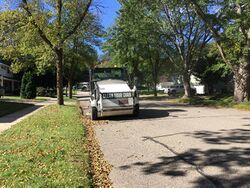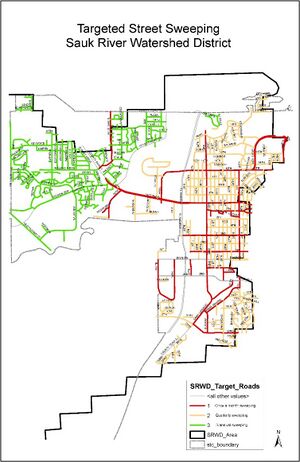
Difference between revisions of "Lessons learned and advice from street sweeping programs"
m |
|||
| (3 intermediate revisions by the same user not shown) | |||
| Line 4: | Line 4: | ||
==Training and staff== | ==Training and staff== | ||
| + | [[File:Rochester sweeping.jpg|250px|thumb|alt=Rochester street sweeper removes leaves from a roadway and displays one of the outreach messages about debris prevention |<font size=3>Rochester street sweeper removes displays one of the outreach messages about debris prevention.</font size>]] | ||
| + | |||
*Cross train staff to develop well-trained staff that can provide consistency across job functions. | *Cross train staff to develop well-trained staff that can provide consistency across job functions. | ||
*Street sweeping staff are experienced, know the city well and take pride in their work. Sweeper staff help with scheduling, identifying hotspots, and have made recommendations for operational improvements. Their ownership over the sweeping operations improves the quality of work. | *Street sweeping staff are experienced, know the city well and take pride in their work. Sweeper staff help with scheduling, identifying hotspots, and have made recommendations for operational improvements. Their ownership over the sweeping operations improves the quality of work. | ||
==Funding and costs== | ==Funding and costs== | ||
| + | [[File:St Cloud sweeping.jpg|300px|thumb|alt=map of targeted street sweeping Sauk River Watershed District|<font size=3>Map of targeted street sweeping for the Sauk River Watershed District</font size>]] | ||
| + | |||
*Having a watershed/implementation plan that identifies street sweeping for water quality as a high priority is key to receiving funding for equipment. | *Having a watershed/implementation plan that identifies street sweeping for water quality as a high priority is key to receiving funding for equipment. | ||
*Collect data to illustrate the importance and effectiveness of sweeping and justify funding expenditures. | *Collect data to illustrate the importance and effectiveness of sweeping and justify funding expenditures. | ||
| Line 15: | Line 19: | ||
==Outreach and communication== | ==Outreach and communication== | ||
| − | |||
| − | |||
*Conduct as much public education and outreach as possible to residents and city staff. Focus on explaining the importance of water quality and make the connection with street sweeping operations. This leads to operator and citizen buy-in and interest. | *Conduct as much public education and outreach as possible to residents and city staff. Focus on explaining the importance of water quality and make the connection with street sweeping operations. This leads to operator and citizen buy-in and interest. | ||
*A good street sweeping program can create a positive perception of how residents’ tax dollars are being spent. | *A good street sweeping program can create a positive perception of how residents’ tax dollars are being spent. | ||
| Line 30: | Line 32: | ||
*'''Don’t contract'''. Hiring contractors can cause potential scheduling conflicts, limiting the city’s ability to sweep leaves timed with leaf drop. Sweeping quality may go down as contractors are incentivized to cover lane miles, rather than conduct sweeping for water quality. | *'''Don’t contract'''. Hiring contractors can cause potential scheduling conflicts, limiting the city’s ability to sweep leaves timed with leaf drop. Sweeping quality may go down as contractors are incentivized to cover lane miles, rather than conduct sweeping for water quality. | ||
*'''Fall sweeping''': Sweep as much as possible before snow fall to reduce sweeping needs in spring. Reduce or eliminate sand application in winter to reduce spring sweeping needs. | *'''Fall sweeping''': Sweep as much as possible before snow fall to reduce sweeping needs in spring. Reduce or eliminate sand application in winter to reduce spring sweeping needs. | ||
| + | |||
| + | <noinclude> | ||
| + | [[Category:Level 3 - Best management practices/Nonstructural practices/Street sweeping]] | ||
| + | </noinclude> | ||
Latest revision as of 19:14, 18 July 2022
In December, 2021, TetraTech and the MPCA interviewed staff from seven Minnesota cities that conduct street sweeping. Information from these interviews is summarized in case studies for each city.
Below is a summary of lessons learned and advice from these interviews. Some lessons learned are not included below but instead were incorporated into the page on recommended street sweeping practices.
Training and staff
- Cross train staff to develop well-trained staff that can provide consistency across job functions.
- Street sweeping staff are experienced, know the city well and take pride in their work. Sweeper staff help with scheduling, identifying hotspots, and have made recommendations for operational improvements. Their ownership over the sweeping operations improves the quality of work.
Funding and costs
- Having a watershed/implementation plan that identifies street sweeping for water quality as a high priority is key to receiving funding for equipment.
- Collect data to illustrate the importance and effectiveness of sweeping and justify funding expenditures.
- Track hours and costs of operating a sweeping program. Tracking helps allocate and plan staff time and illustrates the need for additional staff time for routine stormwater inspection and maintenance activities.
- Consider replacing sweepers on a 6-year cycle. Cost-benefit analysis suggests maintenance costs increase later in the cycle and trading in machines before they need repairs saves money.
- Test equipment prior to purchase, especially in hilly areas and areas that are hard to reach (e.g., narrow alleys).
Outreach and communication
- Conduct as much public education and outreach as possible to residents and city staff. Focus on explaining the importance of water quality and make the connection with street sweeping operations. This leads to operator and citizen buy-in and interest.
- A good street sweeping program can create a positive perception of how residents’ tax dollars are being spent.
Operations
- Reduce water use: Rather than using water, consider using brooms to push the material onto the road and then sweep it up, allowing for better material recovery and no additional runoff.
- Technology: Focus on incorporating technology, such as GPS and GIS, to understand hotspots and maximize the benefits of sweeping.
- Parking Restrictions: Consider parking restrictions to help maximize sweeper contact with the curb line where most material accumulates.
- Tree Inventory: Conduct a tree inventory to more easily predict leaf drop and spring budding and determine where sweepers will be needed.
- Disposal: Disposal can be challenging and costly. Include disposal costs in overall programmatic costs. Explore disposal options.
- Watchful eyes: The constant presence of sweepers and operators helps control vandalism of city infrastructure, illegal refuse disposal, and illicit discharges.
- Data Collection: Find a simple method to collect data about your operation. Show staff the results of how their data are used so they understand what they are doing makes a difference.
- Don’t contract. Hiring contractors can cause potential scheduling conflicts, limiting the city’s ability to sweep leaves timed with leaf drop. Sweeping quality may go down as contractors are incentivized to cover lane miles, rather than conduct sweeping for water quality.
- Fall sweeping: Sweep as much as possible before snow fall to reduce sweeping needs in spring. Reduce or eliminate sand application in winter to reduce spring sweeping needs.
This page was last edited on 18 July 2022, at 19:14.

